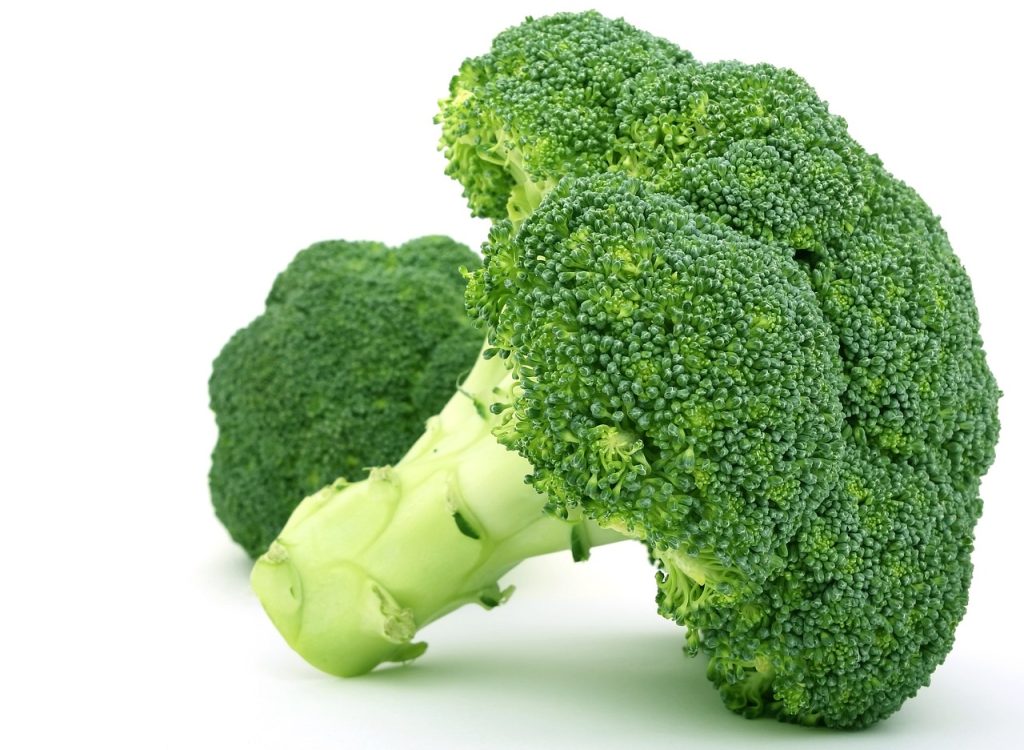Table of Contents
Broccoli is a green vegetable that belongs to the cabbage family. It is an excellent source of vitamins, minerals, and fiber. Broccoli is one of the most nutritious vegetables and is known for its numerous health benefits. In this article, we will discuss the nutritional facts about broccoli, its benefits, and how to incorporate it into your diet.

What is broccoli?
Broccoli is a cruciferous vegetable that belongs to the same family as cauliflower, cabbage, and kale. It is a green vegetable that has a tree-like shape, with a thick stem and tightly clustered flower buds that are usually green but can also be purple. Broccoli is known for its high nutritional content and is packed with vitamins, minerals, fiber, and other beneficial compounds. It is a versatile vegetable that can be eaten raw or cooked and can be used in a variety of dishes, from salads to stir-fries.
Types of broccoli
Calabrese Broccoli
This is the most commonly grown type of broccoli, with a large, green head made up of many tightly packed flower buds.
Sprouting Broccoli
Also known as “Broccolini,” this type of broccoli has smaller florets and long, thin stalks. It is often sweeter and more tender than other types of broccoli.
Romanesco Broccoli
This type of broccoli has a distinct geometric shape, with a pointed, cone-like head made up of many smaller, spiral-shaped buds.
Purple Broccoli
As the name suggests, this type of broccoli has a purple color and is higher in antioxidants than other types of broccoli.
Broccoflower
This is a cross between broccoli and cauliflower, with a light green head that has a slightly sweeter and milder taste than traditional broccoli.
Chinese Broccoli
Also known as “Gai Lan,” this type of broccoli has long, slender stems and small, tender leaves. It has a slightly bitter taste and is often used in Chinese cuisine.
Nutritional Facts About Broccoli
One cup (91 grams) of chopped raw broccoli contains approximately
31 calories
2.6 grams of protein
6 grams of carbohydrates
2.4 grams of fiber
0.3 grams of fat
Broccoli is also an excellent source of many vitamins and minerals, including
Vitamin C
One cup of chopped broccoli contains more than 100% of the recommended daily intake of vitamin C.
Vitamin K
One cup of chopped broccoli contains more than 100% of the recommended daily intake of vitamin K.
Vitamin A
Broccoli is a good source of beta-carotene, which the body can convert into vitamin A.
Folate
One cup of chopped broccoli contains about 14% of the recommended daily intake of folate.
Potassium
One cup of chopped broccoli contains about 8% of the recommended daily intake of potassium.
Iron
One cup of chopped broccoli contains about 6% of the recommended daily intake of iron.
Broccoli also contains compounds that have been linked to various health benefits, such as
Sulforaphane
This compound has been shown to have anti-cancer properties.
Indole-3-carbinol
This compound may help reduce the risk of certain types of cancer.
Glucosinolates
These compounds may help support liver function and reduce inflammation in the body.
Benefits of Broccoli

Broccoli is Nutrient Dense
Broccoli is packed with vitamins and minerals that are essential for good health. It contains vitamin C, vitamin K, vitamin A, folate, potassium, and iron, among other nutrients. These nutrients work together to support various bodily functions, including immune function, bone health, and blood clotting.
Improves Digestion
Broccoli is an excellent source of fiber that aids in digestion and prevents constipation. It also contains a compound called sulforaphane that helps protect the stomach lining from damage caused by harmful bacteria. Regular consumption of broccoli can improve gut health and reduce the risk of digestive disorders.
Promotes Heart Health
Broccoli is rich in antioxidants and fiber that reduce the risk of heart diseases. The sulforaphane in broccoli also helps lower blood pressure and cholesterol levels, preventing the formation of blood clots in the arteries. A study found that eating broccoli twice a week can lower the risk of heart disease by 4%.
Boosts the Immune System
Broccoli is loaded with vitamin C, which is known to boost the immune system. It also contains a compound called glucoraphanin that helps activate the immune cells and fight against infections. Regular consumption of broccoli can strengthen the immune system and protect against diseases.
Lowers Cholesterol Levels
Broccoli contains soluble fiber that binds with bile acids in the digestive system, reducing the absorption of cholesterol in the body. This helps lower the levels of LDL or “bad” cholesterol in the blood, reducing the risk of heart disease.
Reduces Inflammation
Broccoli contains anti-inflammatory compounds that reduce inflammation in the body. Regular consumption of broccoli can help reduce the risk of chronic diseases like arthritis, asthma, and cancer.
Aids in Weight Loss
Broccoli is low in calories and high in fiber, making it an excellent food for weight loss. The fiber in broccoli helps you feel full, reducing your appetite and calorie intake. A study found that consuming broccoli regularly can reduce the risk of obesity and promote weight loss.

Prevents Cancer
Broccoli contains a compound called sulforaphane which has anticancer properties. Sulforaphane works by reducing the growth and spread of cancer cells and inducing cell death. Broccoli also contains indole-3-carbinol, which helps lower the risk of breast, prostate, and colon cancers.
Enhances Bone Health
Broccoli is an excellent source of calcium, magnesium, and vitamin K, all of which are essential for maintaining strong bones. Vitamin K helps improve calcium absorption and reduces the risk of bone fractures. Consuming broccoli regularly can promote bone health and reduce the risk of osteoporosis.
Reduces the Risk of Birth Defects
Broccoli contains high levels of folate, a B vitamin that is crucial for fetal development. Folate helps prevent birth defects in the brain and spine, making it an essential nutrient for pregnant women.
Fights Against Aging
Broccoli contains antioxidants like vitamin C and beta-carotene that protect the body against free radical damage. Free radicals are unstable molecules that can damage cells and accelerate the aging process. Regular consumption of broccoli can help fight against aging and improve overall health.
Improves Eye Health
Broccoli is rich in lutein and zeaxanthin, two antioxidants that protect the eyes from damage caused by UV radiation. These antioxidants also help reduce the risk of age-related macular degeneration, a common cause of blindness in older adults.

Supports a healthy pregnancy
Broccoli is an excellent source of folate, a B vitamin that is essential for fetal development during pregnancy. Folate helps in the formation of the baby’s neural tube, which develops into the brain and spinal cord. Adequate folate intake during pregnancy can reduce the risk of birth defects in the baby.
broccoli is also rich in iron, calcium, and other nutrients that are important for the mother’s health during pregnancy. Eating broccoli during pregnancy can help support a healthy pregnancy and promote the growth and development of the baby.
How to Incorporate Broccoli into Your Diet?
Here are some easy and delicious ways to incorporate broccoli into your diet:
- Add chopped broccoli to your omelet or frittata.
- Roast broccoli with garlic and olive oil for a flavorful side dish.
- Steam broccoli and toss it with lemon juice and parmesan cheese.
- Add broccoli to your stir-fry or pasta dishes.
- Make a broccoli soup or salad.
Healthy and Delicious Broccoli Recipes

Broccoli and Quinoa Salad
Ingredients
- 1 cup uncooked quinoa
- 2 cups chopped broccoli florets
- 1/4 cup chopped red onion
- 1/4 cup chopped fresh parsley
- 1/4 cup chopped almonds
- 1/4 cup olive oil
- 2 tablespoons lemon juice
- Salt and pepper to taste
Instructions
- Cook the quinoa according to package instructions and let it cool.
- In a large bowl, mix together the quinoa, broccoli, red onion, parsley, and almonds.
- In a separate bowl, whisk together the olive oil, lemon juice, salt, and pepper.
- Pour the dressing over the salad and toss to combine.
- Serve chilled.
Broccoli and Cheddar Soup
Ingredients
- 1 tablespoon butter
- 1 small onion, chopped
- 2 cloves garlic, minced
- 3 cups chopped broccoli florets
- 3 cups chicken or vegetable broth
- 1 cup shredded cheddar cheese
- Salt and pepper to taste
Instructions
- In a large pot, melt the butter over medium heat.
- Add the onion and garlic and sauté for 2-3 minutes until softened.
- Add the broccoli and broth to the pot and bring to a simmer.
- Simmer for 10-15 minutes until the broccoli is tender.
- Use an immersion blender to puree the soup until smooth.
- Stir in the cheddar cheese until melted and season with salt and pepper to taste.
- Serve hot.
Broccoli and Mushroom Stir-Fry
Ingredients
- 2 tablespoons vegetable oil
- 1 pound sliced mushrooms
- 3 cups chopped broccoli florets
- 3 cloves garlic, minced
- 1 tablespoon soy sauce
- 1 tablespoon oyster sauce
- Salt and pepper to taste
Instructions
- Heat the vegetable oil in a large skillet over high heat.
- Add the mushrooms and sauté for 2-3 minutes until browned.
- Add the broccoli and garlic to the skillet and stir-fry for an additional 2-3 minutes.
- Add the soy sauce, oyster sauce, salt, and pepper to the skillet and stir to combine.
- Continue to stir-fry for 1-2 minutes until the broccoli is tender.
- Serve hot over rice or noodles.
Side Effects of broccoli
Digestive problems
Broccoli is high in fiber, which can cause digestive problems like bloating, gas, and constipation. Consuming too much broccoli or increasing its intake suddenly can cause these digestive problems.
Allergic reactions
Some people may be allergic to broccoli and may experience allergic reactions like itching, swelling, and difficulty breathing. If you experience any of these symptoms after consuming broccoli, you must seek medical attention immediately.
Thyroid issues
Broccoli contains goitrogens, which can interfere with the production of thyroid hormones. Consuming large amounts of raw broccoli can lead to thyroid problems in people with a history of thyroid issues.
Allergic reactions
Some people may be allergic to broccoli or other cruciferous vegetables. Symptoms of an allergic reaction may include hives, itching, swelling, and difficulty breathing.
Interference with certain medications
Broccoli contains compounds that can interfere with certain medications, including some antidepressants and chemotherapy drugs. It is important to consult with your doctor before consuming large amounts of broccoli if you are taking any medication.
In conclusion, while broccoli is a superfood packed with essential nutrients and health benefits, it is important to be aware of the potential side effects. If you experience any adverse effects after consuming broccoli, it is best to consult with your doctor.
Risk of Heavy Metal Toxicity
Broccoli is a bioaccumulator, meaning it can absorb heavy metals from the soil. Consuming large amounts of broccoli that has been grown in contaminated soil can lead to heavy metal toxicity, which can cause serious health problems. It is important to buy broccoli from reputable sources to ensure that it has been grown in safe soil.
FAQs
Is broccoli low in calories?
A. Yes, broccoli is low in calories. One cup of chopped broccoli contains only 31 calories.
Is broccoli good for weight loss?
Yes, broccoli is a great food to include in a weight loss diet. It is low in calories and high in fiber, which helps to keep you feeling full for longer.
Can broccoli be eaten raw?
Yes, broccoli can be eaten raw. It is a crunchy and delicious addition to salads.
How should I cook broccoli to retain its nutrients?
Broccoli is best cooked by steaming or roasting to retain its nutrients. Avoid boiling or microwaving it for too long, as it can result in a loss of nutrients.
Can broccoli be eaten raw?
Yes, broccoli can be eaten raw, and it is an excellent addition to salads and dips.
How much broccoli should I eat in a day?
The recommended daily intake of broccoli is 1-2 cups, depending on your age, gender, and activity level.
Can broccoli help with weight loss?
Yes, broccoli is a low-calorie and high-fiber food that can aid in weight loss by reducing appetite and calorie intake.
Is it safe to eat broccoli during pregnancy?
Yes, broccoli is a safe and healthy food to eat during pregnancy. It is rich in folate and other nutrients that are important for fetal development.
Conclusion
Broccoli is a nutritious and delicious vegetable that should be included in everyone’s diet. It is packed with vitamins, minerals, and fiber and offers numerous health benefits. By incorporating broccoli into your meals, you can boost your health, support your immune system, promote digestion, prevent chronic diseases, and support bone and skin health. So why not add this superfood to your diet today? Whether you roast it, steam it, or eat it raw, broccoli is a versatile and nutritious vegetable that can benefit your health in countless ways. Remember the nutritional facts about broccoli and enjoy this superfood for a healthier you.















